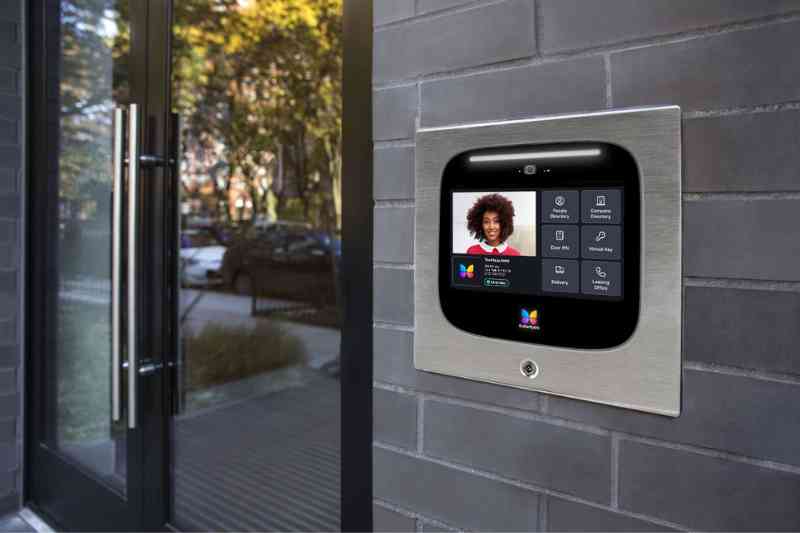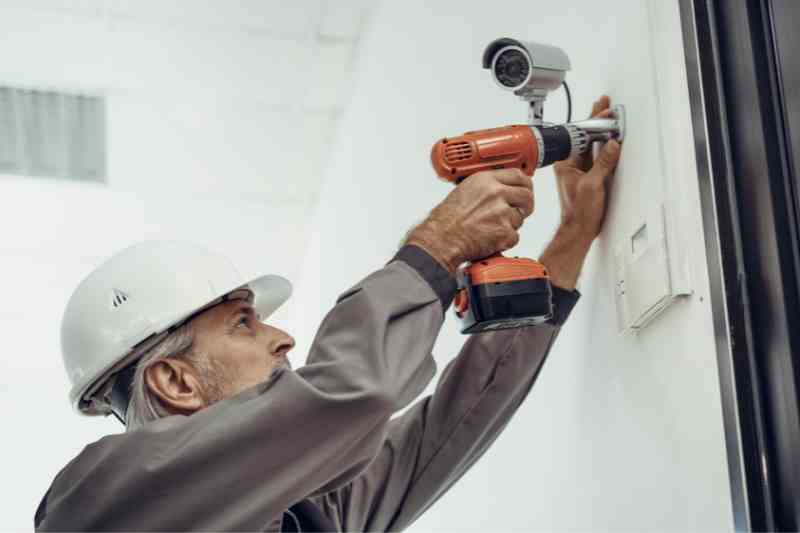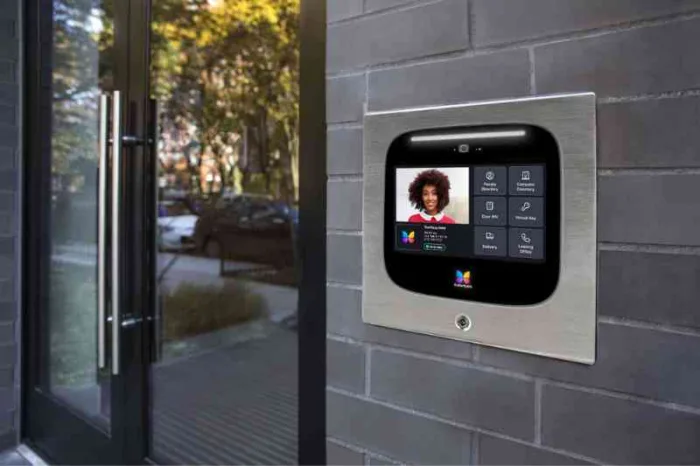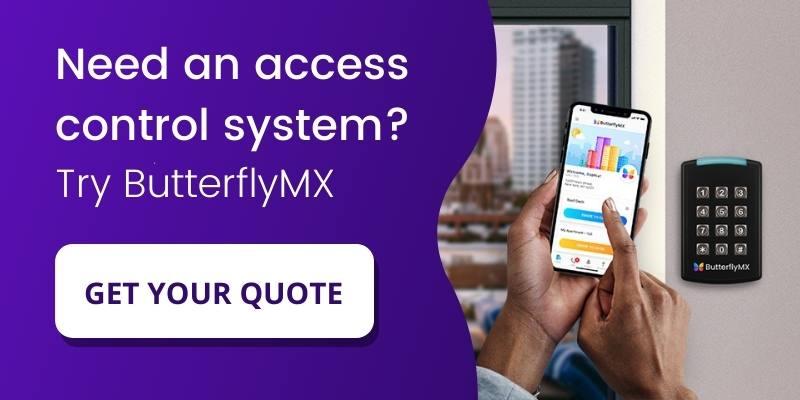Key takeaways
- Comprehensive security systems are essential for businesses to protect buildings, employees, residents, and assets.
- Business access control is a critical component of any security system, offering features like mobile credentials and remote management.
- The cost of business security systems varies based on hardware, installation, and the type of system you choose.
- Customizability and integrations are key when choosing the best business access control and security solution.

Every business needs a comprehensive business security system to monitor access at their commercial building. As such, commercial security systems help protect your building, staff, and clients from the risks associated with break-ins and theft. And they do this all while ensuring seamless access to your property for authorized tenants and employees.
In this guide, we cover what a commercial security system is and what type of hardware makes it up. Then, you’ll learn why businesses need access control and other security measures. Finally, we help you discover the best commercial security system for your building.
In this post, we cover:
- 5 best commercial security systems
- What makes up a commercial security system?
- Why do you need a business access control system?
- How to choose the best business security system
- How much do commercial security systems cost?
- Commercial security systems FAQs
5 best commercial security systems
Are you looking to replace or upgrade your commercial door entry security system?
Luckily, there are plenty of options on the market to consider. Additionally, the best security systems are intuitive and easy to use, all while strengthening security at your commercial building.
Five popular commercial security systems companies to consider are:
1. ButterflyMX
ButterflyMX is a cloud-based access control company that’s been installed in more than 15,000 buildings and garnered over 40,000 five-star reviews. Our products offer the best commercial security solutions for all types of businesses, from offices to apartment buildings.
Here is a rundown of some of ButterflyMX’s products:
- Video Intercom. As our flagship product, the ButterflyMX Video Intercom is designed for apartment buildings, offices, and gated communities. It enables residents to grant themselves, guests, and delivery drivers access via our highly-rated mobile app.
- Access Control System. ButterflyMX’s Access Control System is for businesses of all sizes, giving them the ability to manage access through our mobile app or online dashboard. Choose between a wide variety of supported credentials, such as our mobile app, PIN codes, key cards, and fobs.
- Security Cameras. Choose between our Dome and Bullet Security Cameras to capture HD video footage 24/7 that is stored in our powerful cloud-based OS. Moreover, our cameras are built to withstand a variety of weather conditions, ensuring you gain as much insight as possible about your property.
- Vehicle Access Control. Manage access to your garage, parking lot, or gated property by using our Vehicle Reader and Windshield tags. This system lets your employees or residents enter the property hands-free, providing maximum convenience.
- Elevator Controls. ButterflyMX Elevator Controls manages who can enter certain floors of your property with a key-fobbed elevator. Ensure guests can only access the floors of the respective tenants who let them in, increasing safety and peace of mind.
Comparing the five best commercial security systems:
2. ADT
Google rating: 4.2/5
ADT commercial security systems are a long-standing contender in the security industry, known for its comprehensive and reliable services. Furthermore, they offer a broad range of security solutions, and integrated technology with professional monitoring to provide robust protection. Lastly, their systems include intrusion detection, video surveillance, access control, and environmental monitoring.
Pros:
- User-friendly.
- Offers professional installation by certified installers.
- 24/7 remote monitoring.
- Has a mobile app.
Cons:
- They may only offer a three-year contract, so there may not be much flexibility.
3. SimpliSafe
Google rating 4/5
SimpliSafe provides straightforward, DIY commercial security systems that combine ease of installation with building protection. Ideal for small to medium-sized businesses, SimpliSafe offers wireless security solutions that are both affordable and highly effective. What’s more, their systems feature 24/7 professional monitoring with subscription, video surveillance, and smart home integration.
Pros:
- Offers affordable and customizable monitoring plans.
- Choose between professional or DIY installation.
- Easy to manage remotely through an app.
- Integrated with Alexa and Google Assistant.
Cons:
- May not be compatible with Apple HomeKit.
- Cameras could malfunction when temperatures drop below 20°.
4. FrontPoint
Google rating: 4/5
FrontPoint delivers advanced security systems with a focus on smart technology and customer service. Furthermore, their wireless, DIY installations are complemented by professional monitoring and a range of features including video surveillance, environmental monitoring, and smart home automation. Lastly, FrontPoint’s commitment to customer satisfaction is evident in their customizable solutions and robust support.
Pros:
- Easy DIY installation.
- Has Alexa, Google Assistant, and Z-wave compatibility.
- Comes with geofencing to create a virtual perimeter for your property.
- ID theft protection.
Cons:
- FrontPoint may not offer self-monitoring.
5. Vivint
Google rating 4/5
Vivint is known for its innovative smart security solutions, integrating cutting-edge technology with comprehensive monitoring services. As such, their systems offer advanced features such as AI-driven video analytics, smart locks, and energy management, all controlled via a user-friendly mobile app.
Pros:
- Offers professional installation.
- Has smart home connectivity with Google Assistant and Alexa integrations.
- Professional monitoring services are offered.
Cons:
- The 60-month contract may not be flexible.
- Vivint may not offer self-monitoring.
- You may have to pay a $129 moving fee if you move and the system needs to be reinstalled.
What makes up a commercial security system?
Commercial security systems are comprised of a variety of advanced technologies that are designed to protect businesses, offices, and apartment buildings. These systems work together to prevent theft, vandalism, break-ins, and more, ensuring the safety of both people and assets within their homes and workplaces.
Business security systems typically contain the following:
Learn more about ButterflyMX:
Alarm systems
Alarm systems are one of the most fundamental components of a security system, offering immediate alerts in case of unauthorized entry. These systems are typically equipped with sensors placed on doors and windows to detect suspicious activity.
When triggered, the alarm can notify building staff, security personnel, or local law enforcement, depending on the system’s configuration. Modern alarm systems often integrate with other technologies like video surveillance and mobile apps for real-time monitoring and response.
Security cameras
Security cameras provide businesses with 24/7 video surveillance to monitor and record activities in and around their properties. These systems offer live video feeds and can store footage for later review, helping identify potential security breaches, track movements, and deter criminal activity.
Popular types of security cameras include bullet cameras and turret cameras, each suited for different areas of a property. Advanced features like motion detection, night vision, and remote access enhance the camera’s functionality, providing comprehensive coverage of the premises.
Access control systems
Business access control systems manage who can enter and exit a building or specific areas within it. For businesses, access control is critical to ensuring that only authorized personnel have access to sensitive locations like offices, amenity spaces, and more.
Modern access control systems for businesses offer a range of solutions, including:
- Key fobs and key cards. Allow users to scan for entry but require distribution and replacement if lost.
- Keypads. Let staff enter a PIN for access, eliminating the need for physical keys.
- Cloud-based access control. Enables administrators to manage permissions remotely via a web-based dashboard.
- Mobile access control. Allows employees to use their smartphones to enter, providing a convenient, touchless experience.
- Video intercoms. Offer visual verification at entrances, allowing administrators to confirm visitors before granting access.
- Vehicle access control. Regulates vehicle entry and exit, commonly used at gates or parking structures. These systems use a vehicle reader to scan an RFID windshield tag on authorized vehicles, granting hands-free access.
Motion detectors
Motion detectors are an essential part of any commercial security system, alerting staff to movement in restricted or unmonitored areas. These detectors use infrared or microwave technology to detect changes in movement or temperature, triggering an alarm or notifying security personnel. Motion detectors are often integrated with alarm systems and video surveillance to provide a comprehensive layer of protection, especially during non-business hours.
Cybersecurity
As businesses increasingly rely on digital tools and networks, cybersecurity has become a critical component of commercial security systems. Cybersecurity solutions use a combination of hardware and software to protect sensitive data from cyberattacks, malware, and data breaches.
For companies handling customer data, intellectual property, or financial information, robust cybersecurity measures are essential for safeguarding against digital threats. Cybersecurity systems often include firewalls, antivirus software, data encryption, and network monitoring to defend against unauthorized access or malicious activity.
How do commercial security systems work?
Business security systems use standalone devices or a combination of security technologies to manage access, record video footage, and prevent crime at commercial buildings. Moreover, most systems rely on multiple hardware components that send data to one unified software platform. From this platform, building staff or management can review video footage, door entries, and other events.
Furthermore, every corporate security system operates differently depending on the devices and security measures involved in that particular system. Generally, security systems for businesses are highly customizable, meaning you can select which security measures are most important to your building.
Why do you need a business access control system?
Businesses need robust access control systems to ensure the safety of employees, guests, and sensitive information. Virtually every business, whether large or small, should invest in an effective physical access control system.
Some of the benefits of office door entry systems include:
- Ensuring permissions-based building access. Administrators can control who gains access to certain parts of the building quickly.
- Improved security. Business access control systems improve security by ensuring that only authorized people can access the building and areas within it. Some systems also keep a digital log of everyone who opens a door as an added security measure.
- Simplified building management. The right business access control system gives staff more time to focus on other duties by streamlining administrative tasks.
- Managing access for deliveries and visitors. Video intercoms let you control access at the front entrance by allowing you to see visitors and even launch two-way calls with them. This makes it easy for you to verify deliveries and visitors, like vendors or people interviewing for jobs.
The benefits of access control for small businesses
If you’re a small business owner, you may wonder if you even need building-wide access control – after all, there’s only a limited number of staff for you to manage. However, access control systems can positively impact your business operations, even if you have a small or mid-size organization.
Small businesses may be more susceptible to theft because they’re easier to break into than large businesses. Having an access control system that uses video and cloud-based technologies can help curb this risk by giving you access to live feeds of your building and verifying a visitor’s identity before letting them in.
How to choose the best business security system
Choosing the best business access control system can vastly improve your employees’ experience working in the building. You’ll want to invest in a business access control system that’s intuitive, modern, and allows staff to maintain productivity.
Here’s how to choose the best business security system:
- Evaluate your needs. Do you have a small office in a mixed-use building? Or do you own a multi-story office building without any other tenants? Consider the size and your business’s place in the building before choosing a system.
- Consider integrations. Lots of access control systems integrate with other technologies — both hardware and software. This will help make your building access experience cohesive. You may even want to work with a security integrator who can help you create an ecosystem of devices.
- Assess features. Choose a business access control system with innovative features that improve the tenant experience like visitor management and smartphone-based access.
How much do commercial security systems cost?
The cost of commercial security systems installation varies depending on the type of system you choose.
However, the cost usually depends on three factors:
- Hardware. The hardware for commercial security systems usually costs between $1,000-$2,500. However, this depends on the size of your building and the number of users. Typically, this includes hardware like security cameras and alarms.
- Installation and activation. On average, business security system installation costs around $300-$500. However, it can vary depending on the size of your building. So, we recommend you choose a certified installer through your security provider to complete the installation.
- Business monitoring. Continuous 24/7 alarm and business monitoring usually cost around $40-$120. As such, the cost increases if you opt for fire and burglary monitoring. Additionally, costs can increase even more depending on the number of sensors and cameras you have.

How much should you spend on security systems for small businesses?
Small businesses often lack the security measures that larger commercial businesses have. As a result, they’re often more vulnerable to break-ins.
Small business security systems should offer a flexible solution without breaking the bank. So, small businesses need commercial building security systems that are effective as well as budget conscious.
Commercial security systems FAQs
Here are some commonly asked questions about commercial security systems:
- Which are two types of commercial security?
- What is the difference between residential and commercial security systems?
- Can Ring cameras be used for commercial use?
Which are two types of commercial security?
The two primary types of commercial security are physical security and electronic security:
- Physical security. This includes measures like security personnel, barriers, locks, and reinforced doors designed to prevent unauthorized access and protect your assets.
- Electronic security. This involves using technology such as security cameras, access control systems, alarms, and sensors to monitor, detect, and respond to security threats in real-time.
What is the difference between residential and commercial security systems?
The key differences between residential and commercial security systems are scale, complexity, and customization:
- Scale. Commercial security systems are typically larger and cover more extensive areas, like multiple buildings or large commercial spaces, compared to residential systems, which are designed for individual homes or small properties.
- Complexity. Commercial systems often require advanced features like integrated access control, video surveillance, and remote monitoring, while residential systems focus more on basic intrusion detection and home automation.
- Customization. Commercial security systems are highly customizable to meet the specific needs of different industries, such as retail, offices, or industrial sites. In contrast, residential systems are generally standardized with options for personalization based on individual homeowner preferences.
Can Ring cameras be used for commercial use?
While Ring cameras are primarily designed for residential use, they can be used in small commercial settings. However, they may not offer the advanced features, scalability, or durability required for larger commercial properties.
For businesses seeking robust security solutions, dedicated commercial-grade cameras, like those offered by ButterflyMX, are typically a better choice due to their enhanced security features, integration capabilities, and reliability.
Disclaimer: ButterflyMX provides these blog posts to help our customers and potential customers make the right business decisions for them. Our blog posts are based on the information we have available to us at the time of writing.







